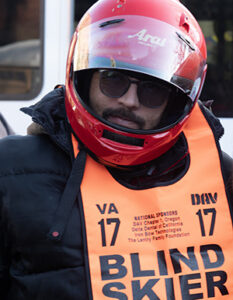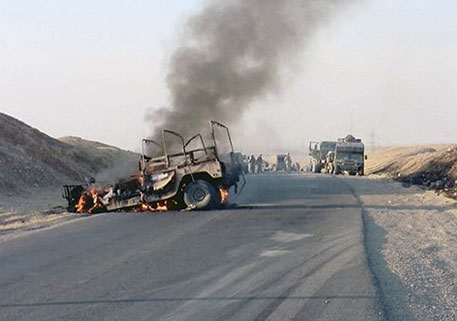 When Army Veteran Erik Castillo came out of a nearly two-month coma, he was at Walter Reed Army Medical Center in Washington, D.C.—more than 6,000 miles from where he had been wounded in Baghdad.
When Army Veteran Erik Castillo came out of a nearly two-month coma, he was at Walter Reed Army Medical Center in Washington, D.C.—more than 6,000 miles from where he had been wounded in Baghdad.
He was seven months into his deployment in 2004 and standing next to his Humvee when a nearby explosion hurled shrapnel through the right side of his head and into his brain.
“I woke up paralyzed,” Castillo said. “At first, I didn’t know what happened to me. It was confusing. Over time, I actually was able to process and understand how bad the injury was.”
Doctors had removed a portion of his skull and brain to save his life and gave him very low odds that he’d ever walk or talk again.
But Castillo said his body was telling him different.
“It makes you want to get back to your normal state, which to me before going to sleep—obviously with the coma—was walking,” he said. “It’s all natural that your body wants to do things how it naturally does it.”
As much as he felt his body fighting to heal and walk again, it was an arduous process to regain any sense of independence.
For years, he used a wheelchair, only able to walk “like a stiff robot” for short distances during physical therapy. He endured countless hours of rehabilitation. He’s had 22 surgeries to reconstruct his face and head, and address other medical issues. He battles memory loss and physical limitations because of his traumatic brain injury.
“I always tell people, if you don’t have it in you, it’s easy to be able to just curl up in a ball and give up and not try,” Castillo said.
He didn’t give up, though, and credits the Department of Veterans Affairs and his family for creating a strong support system that helped him persevere and overcome the odds.
Today, Castillo is a graduate of the University of Arizona and works as an advanced medical support specialist at the VA medical center in Tucson, Arizona. He no longer uses a wheelchair.
However, it wasn’t until last year that he learned about the VA’s adaptive sports program and the opportunities it presented.
“It was kind of life-changing because it gives you a brand-new outlook on life of what you can do,” said Castillo, who had only previously attended the VA’s National Veterans Wheelchair Games once in 2009.
He said attending the 2023 National Disabled Veterans Winter Sports Clinic, co-presented by the VA and DAV, reminded him that he wasn’t alone in his recovery and allowed him to learn how others cope and thrive with their injuries. It was also the first time since he was a young teenager that he got to go skiing.
“I was a little bit scared, but I trusted the instructor to help me learn how to ski and obviously keep me safe on the mountain,” he said.
That experience led him to exploring the other adaptive sports options the VA offers and to encouraging other eligible Veterans to join him.
Castillo’s advice for first-time participants is to not be timid.
“Be open and trust the people that are there to help you be successful and safe to do the events,” he said.
For him, though, the clinic is much more than the sports and activities. It’s also the perspective that comes from developing relationships with the community of Veterans participating.
“Your whole outlook on life changes,” said Castillo. “I think these clinics are actually very powerful.”






